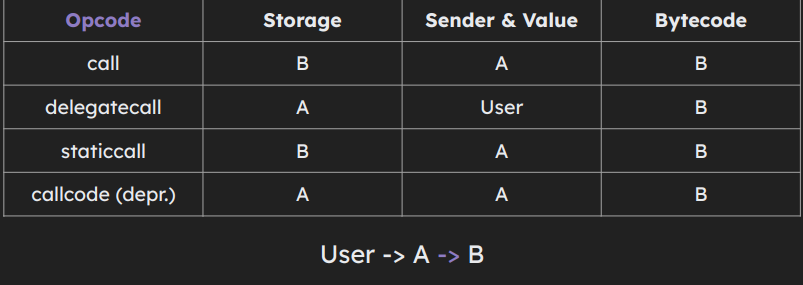- Solidity functions are like open endpoints of smart contracts. Anyone can call and use them. It is fully a smart contract’s responsibility to add proper access control checks and guarantees that the execution is safe for the end user.
contract Example {
function foo(uint256 var) external view returns (address user);
} signature: "foo(uint256)" (name of the function and type it accepts).selector: keccak256("foo(uint256)")[:4] = 0x2fbrbd38 (first 4 bytes of keccak256 hash).- function selector is a special value that solidity uses to distinguish which function you are calling from the outside, to enter the exact function you're calling.
- Functions can be
external,public,internal, andprivate. - Variables can be
public,internal,private, anddefault.
contract Example {
uint256 public counter;
function increment() external returns (uint256) {
return ++counter;
}
} - Functions can have built-in and custom modifiers applied. Built-in modifiers are:
view,pure,payable,override, andvirtual.
contract Example {
address public owner;
modifier onlyOwner() {
require(owner == msg.sender, "Not an owner");
_;
}
constructor () {
owner = msg. sender;
}
function changeOwner (address newOwner) external onlyOwner {
owner = newOwner;
}
} -
Opcode create. Address is calculated as
keccak256(RLP([<sender>, <nonce>]))[12:]. Smart contracts also have nonces, but they start from 1. -
Opcode create2. Address is calculated as
keccak256(0xff, senderAddress, salt, keccak256(init_code))[12:]
contract Example {
function deploy() external {
A a = new A() ;
B b = new B{salt: bytes32(1)}();
}
} interface Callee {
function foo(uint256 amount) external;
}
contract Example {
function testCall(address callee) external {
// high-level call
Callee(callee). foo(1);
// low-level call
(bool ok,) callee.call(abi.encodewithSignature("foo(uint256)", 1));
// delegatecall
(ok,) callee.delegatecall(abt.encodeWithSelector(Callee.foo.selector, 1));
// staticcall
(ok,) = callee.staticcall(abt.encodewithSelector(Callee.foo.selector, 1));
// callcode DEPRECATED
(ok,) callee.callcode(abi.encodewithSelector(Callee.foo,selector, 111;
}
}contract Example {
function bar() public;
function foo() external {
this.bar(); // creates a subcontext = call
bar(); // jump
}
} this.bar()creates a subcontext call, msg.sender insidebar()function will be address of example contractbar()msg.sender will be externally owned account
- Solidity distinguishes static and dynamic types. Static types are encoded in-place (head) and dynamic types are encoded with a calldata offset (head + tail).
abi.encodeWithSignature("deposit(address,uint256)", msg. sender, le18);
->
0x47e7ef24
0000000000000000000000005b38da6a701c568545dcfcb03fcb875f56beddc4
0000000000000000000000000000000000000000000000000de0b6b3a7640000- static types: (
uint256,uint128,bytes32, encoded in place -> directly translated into some bytes). - dynamic types: dynamic array, struct with dynamic arrays,
bytes,strings. encoding of head & tail.
- Solidity events are an abstraction on top of the EVM’s logging functionality. Applications can subscribe and listen to these events through the RPC interface of an Ethereum client.
contract Example {
event ReceivedEther(uint256 amount);
receive() external payable {
emit ReceivedEther(msg.value);
}
} - Events have special “topics” that applications can filter events by.
- 3 topics maximum for normal and 4 for anonymous events.
- 0st topic for non-anonymous event is an event signature.
contract Example {
event ReceivedEther(uint256 indexed amount);
event ReceivedEtherAnon(uint256 amount) anonymous;
receive() external payable {
emit ReceivedEther(msg.value);
emit ReceivedEtherAnon(msg.value);
}
} - There are 3 types of error handling functions: require, revert, assert. Throw is deprecated. Assert used to consume all the provided gas, but Solidity 0.8.0 changed that.
contract Example {
error NotWhitelisted(address token);
function deposit(address token, uint256 amount) external {
assert (amount > 0);
if (!whitelisted[token]) {
revert Notwhitelisted(token) ;
}
require(IERC20(token).transferfrom(msg.sender, address(this), amount), "Transfer failed");
}
} contract Example {
error CustomError();
function doRevert() external {
revert("Oops");
}
function foo() external {
try this.doRevert() {
...
} catch Error(string memory reason) { // "Oops" will be here
...
} catch Panic(uint256 code) {
...
} catch (bytes memory reason) { // CustomError will be here
...
} catch {// equivalent to catch (bytes memory reason)`
}
}
} contract Example {
mapping(address => uint256) public deposits;
function deposit() external payable {
deposits [msg.sender] += msg.value;
}
function withdraw() external {
(bool ok, ) = msg.sender.call({value: deposits[msg.sender]}("");
require(ok, "Transfer failed");
delete deposits [msg.sender];
}
} 